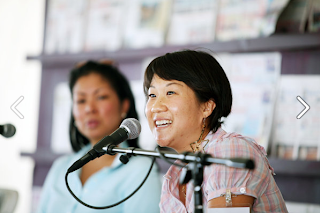I 'm exploring themes and trying to identify strong messages from a very very old collection of manuscripts (Ok, the very word manuscripts signifies their old-ness but I need you to empathize with me here). Yes, there are the usual Bible stories and the ancientness-factor that easily generates the wow-factor regardless of your creed (Like I said, they Are Very Old) BUT something was missing.
Where is the meaningful connection? Why does this matter to the kid who walks in, to the single mom who chills in the park out front, to the security guards I greet every morning?
What makes this important to them?
There has to be universal themes, humans in the 4th century were in fact humans like you and me, right? They loved and lost, like all of us! So I decided to ask a specialist/historian that works very closely with the collection. Instead of the Ah-Ha moment I anticipated, I was shot down quite quickly:
"There are many complex themes, we study them very closely, but I cannot explain them to you...and you - what you are doing for school children, it cannot be conveyed, they just need to know dates and that they are from the Bible."
It hit me.
Just like it did when I was creating a K-3 gallery activity for a 14c. Yoruba mask and the curator scoffed at me, Just like when docents and interpreters are unpaid or hourly staff.
We lack street cred.
Additionally, I'm hit by my own insecurity - Who am I to develop educational programs, to explain, to give value surrounding an ancient object that others have studied, received PhDs published/written about for Years?
So it hit me again (now I'm pretty bruised)
Let's remind each other, encourage each other:
We build connections between the object and the person.
Emotional connections that can draw from their own experiences.
We work in all sorts of communities.
Sometimes they find us, and we find them.
And most importantly,
I understand the kid, the single mom, the security guard.
and I am the kid, the single mom, the security guard.
Sunday, March 24, 2013
Thursday, March 21, 2013
a framework for interpretation

If education is about the negotiation of meaning and museums are a forum for that, then our definitions of the institution must begin to allow, first, for variation in meaning and, second, for interaction between presenters and participants.
- Lisa Roberts, From Knowledge to Narrative: Education and the Changing Museum
Thursday, March 7, 2013
applying meaning towards change
I am realizing that we take the understanding and action of certain museum, education, and development concepts for granted. For instance:
Community
Outreach
Participation
Today we are meeting with teachers at their school. We are going to them.
It's really exciting helping our director apply meaning and purpose to the actions we are taking towards developing stronger partnerships. She had planned a lengthy presentation about our Centre and the ed programs offered and I realized that I hadn't explained or reviewed the fundamental concepts of outreach, partnerships, and collaboration. I suggested asking them questions during the talk and providing a small group activity that would allow them to share their teaching experiences. We met for over an hour discussing the phrase, "getting to know them."
"AH," She said. "I understand this Know. What they like and dislike"
Yes, and their strengths.
and their needs.
"But these teachers, they are the hardest group in Georgia to know"
I tell her it's okay, we can't predict their responses, but we can try to show that we care about their thoughts, their ideas and their experiences.
I helped her structure the meeting in a more interactive way - allowing us to observe and collect data.
It's getting late, and cold.
I am hungry and tired, but we work on. Then she says.
"Sometimes I don't know why we are doing this?"
I know, I say
but remember what you told me when we first met -
that you believe in the power of change.
Community
Outreach
Participation
Today we are meeting with teachers at their school. We are going to them.
It's really exciting helping our director apply meaning and purpose to the actions we are taking towards developing stronger partnerships. She had planned a lengthy presentation about our Centre and the ed programs offered and I realized that I hadn't explained or reviewed the fundamental concepts of outreach, partnerships, and collaboration. I suggested asking them questions during the talk and providing a small group activity that would allow them to share their teaching experiences. We met for over an hour discussing the phrase, "getting to know them."
"AH," She said. "I understand this Know. What they like and dislike"
Yes, and their strengths.
and their needs.
"But these teachers, they are the hardest group in Georgia to know"
I tell her it's okay, we can't predict their responses, but we can try to show that we care about their thoughts, their ideas and their experiences.
I helped her structure the meeting in a more interactive way - allowing us to observe and collect data.
It's getting late, and cold.
I am hungry and tired, but we work on. Then she says.
"Sometimes I don't know why we are doing this?"
I know, I say
but remember what you told me when we first met -
that you believe in the power of change.
Subscribe to:
Posts (Atom)
